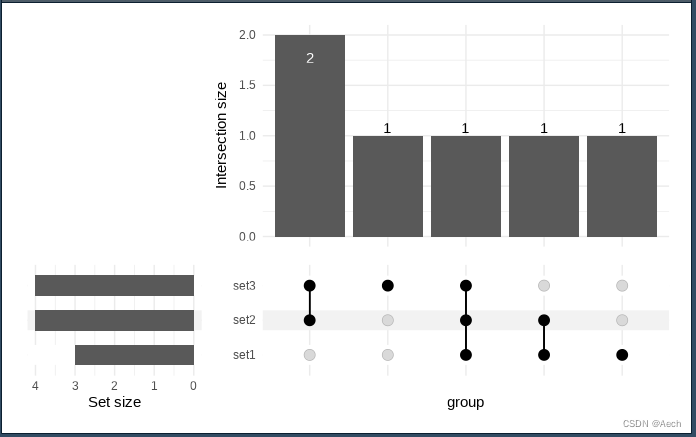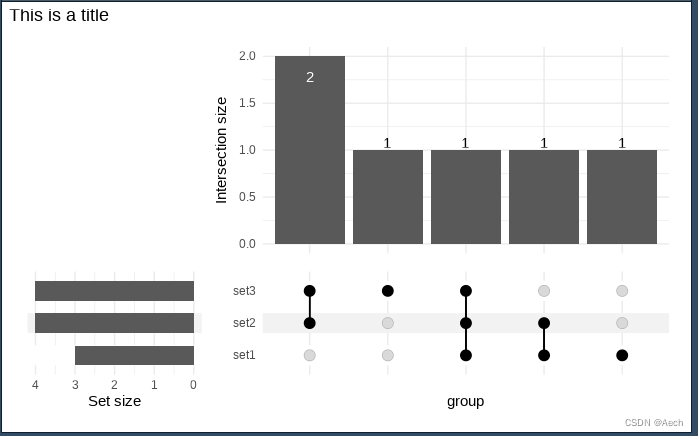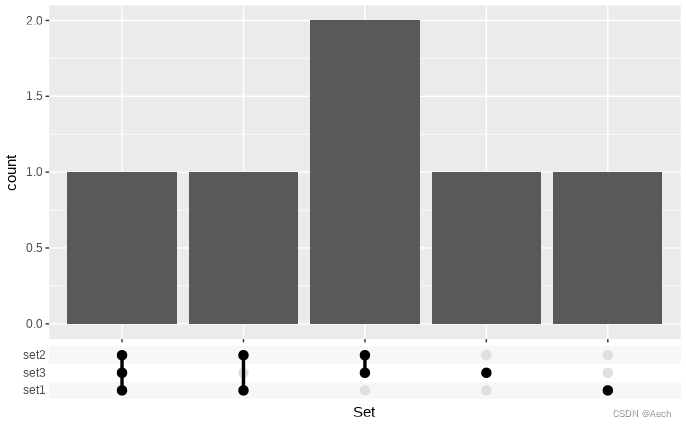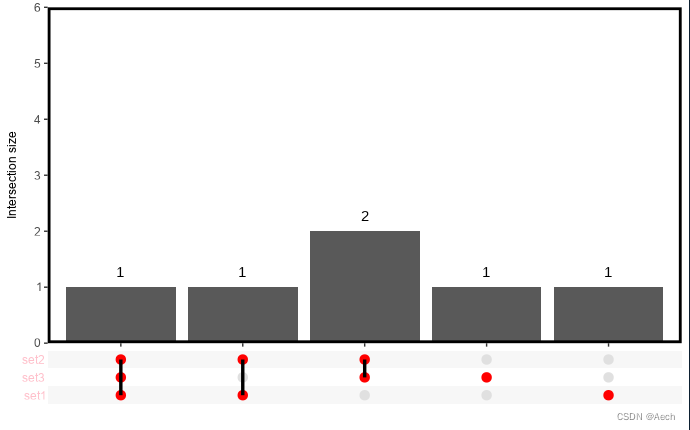upset 绘制
发布时间:2023年12月22日
好久没有更新,今天来一个upset图的绘制
1.1 安装包
#绘制upset的包现在看来有三个
## UpSet
### 最基本的upsetR包,使用方便,但是扩展不方便
devtools::install_github("hms-dbmi/UpSetR")
## complex-upset
### UpSet的升级款 支持ggplot2
devtools::install_github('krassowski/complex-upset')
## ggupset
### 同样是UpSet的升级款 支持ggplot2
devtools::install_github("const-ae/ggupset")
示例数据
library(ggplot2)
library(ggupset)
library(ComplexUpset)
test.list <- list(
set1 = c("a", "b", "c"),
set2 = c("b", "c", "d", "e"),
set3 = c("c", "d", "e", "f")
)
UpSetR
#对于list,利用fromlist()整理数据
UpSetR::upset(fromList(test.list),
order.by = "degree", #还可以选择"degree"
)

ComplexUpset
# 要求输入的是矩阵,如果数据是list,用formlist()转化一下就可以
test.df <- fromList(test.list)
ComplexUpset::upset(test.df,intersect = colnames(test.df))
# 与UpSetR不同的是支持ggplot2语法, 例如
ComplexUpset::upset(test.df, intersect = colnames(test.df), wrap= TRUE) +
ggtitle("This is a title")


ggupset
# 同样是支持ggplot2语法, 但是输入会更加复杂一些
# 主要是通过scale_x_upset()来控制upset的输出, 例如
test.df <- fromList(test.list) %>%
apply(2, as.logical) %>% t() %>%
as.tibble(rownames = "setsnames") %>%
pivot_longer(cols = -setsnames, names_to = "Sets", values_to = "stat") %>%
filter(stat) %>%
select(-stat) %>%
group_by(Sets) %>%
summarize(Set = list(setsnames))
> test.df
# A tibble: 6 × 2
Sets Set
<chr> <list>
1 V1 <chr [1]>
2 V2 <chr [2]>
3 V3 <chr [3]>
4 V4 <chr [2]>
5 V5 <chr [2]>
6 V6 <chr [1]>
> str(test.df)
tibble [6 × 2] (S3: tbl_df/tbl/data.frame)
$ Sets: chr [1:6] "V1" "V2" "V3" "V4" ...
$ Set :List of 6
..$ : chr "set1"
..$ : chr [1:2] "set1" "set2"
..$ : chr [1:3] "set1" "set2" "set3"
..$ : chr [1:2] "set2" "set3"
..$ : chr [1:2] "set2" "set3"
..$ : chr "set3"
test.df %>%
ggplot(aes(x = Set)) +
geom_bar() +
scale_x_upset(
order_by = "degree",
reverse = T,
)

# 然后利用 ggplot2 增加亿点细节
test.df %>%
ggplot(aes(x = Set)) +
geom_bar() +
scale_x_upset(
order_by = "degree",
reverse = T,
)+
geom_text(stat='count', aes(label=after_stat(count)), vjust=-1) +
scale_y_continuous(name = "Intersection size",expand = c(0, 0), limits = c(0, 6))+
theme(text = element_text(family = "ARIAL", colour = "black", size = 9))+
xlab('')+
theme_combmatrix(
combmatrix.label.make_space = TRUE,
combmatrix.label.width = NULL,
combmatrix.label.height = NULL,
combmatrix.label.extra_spacing = 3,
combmatrix.label.total_extra_spacing = unit(10, "pt"),
combmatrix.label.text = element_text(family = "ARIAL", colour = "Pink", size = 9),
combmatrix.panel.margin = unit(c(1.5, 1.5), "pt"),
combmatrix.panel.striped_background = TRUE,
combmatrix.panel.striped_background.color.one = "white",
combmatrix.panel.striped_background.color.two = "#F7F7F7",
combmatrix.panel.point.size = 3,
combmatrix.panel.line.size = 1.2,
combmatrix.panel.point.color.fill = "red",
combmatrix.panel.point.color.empty = "#E0E0E0",
)+
theme(panel.border = element_rect(colour = "black", fill = NA, size = 2))+
theme(panel.background = element_blank(),
axis.text.y = element_text(size = 9))

文章来源:https://blog.csdn.net/Aechh/article/details/135156738
本文来自互联网用户投稿,该文观点仅代表作者本人,不代表本站立场。本站仅提供信息存储空间服务,不拥有所有权,不承担相关法律责任。 如若内容造成侵权/违法违规/事实不符,请联系我的编程经验分享网邮箱:chenni525@qq.com进行投诉反馈,一经查实,立即删除!
本文来自互联网用户投稿,该文观点仅代表作者本人,不代表本站立场。本站仅提供信息存储空间服务,不拥有所有权,不承担相关法律责任。 如若内容造成侵权/违法违规/事实不符,请联系我的编程经验分享网邮箱:chenni525@qq.com进行投诉反馈,一经查实,立即删除!
最新文章
- Python教程
- 深入理解 MySQL 中的 HAVING 关键字和聚合函数
- Qt之QChar编码(1)
- MyBatis入门基础篇
- 用Python脚本实现FFmpeg批量转换
- 自然语言处理(第16课 机器翻译4、5/5)
- 【vue2】基础
- FTP真的安全吗?如何寻找合适的替代FTP?
- 【C语言知识】原码反码和补码
- 代码随想录 496. 下一个更大元素 I
- 第二证券:散户怎么做到日内交易?
- 热拔插系统避免使用 I2C 总线。如因历史原因使用 I2C 总线,电源须采用二极管防止电流反灌。
- 大模型时代下AIGC新浪潮
- HTML--CSS--浮动布局及定位布局
- node.js(express.js)+mysql注册代码优化